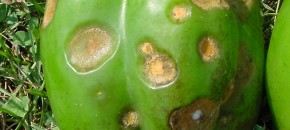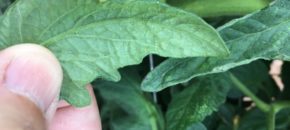Cucurbit powdery mildew (CPM), caused by Podosphaera xanthii, is one the most important diseases of cucurbit crops throughout the world. The pathogen is an obligate parasite, just like cucurbit downy mildew, meaning it needs a living host in order to survive. In northern regions that have a killing frost in the fall the pathogen will […]
Continue reading...Preparing for Pepper Anthracnose in 2020

In recent years, pepper anthracnose caused by Colletotrichum spp. has become a significant problem on some farms in southern New Jersey. Unlike in tomato, where symptoms are only present in mature (red) fruit, pepper anthracnose can infect pepper fruit at any growth stage. Currently, there are no commercially-available bell or non-bell peppers with known resistance […]
Continue reading...Diagnosing Verticillium Wilt in Eggplant
Verticillium wilt is a common soil-borne fungal pathogen that once it has infested soil can remain for a very long time. Verticillium wilt is caused by either Verticillium albo-atrium or Verticillium dahlia and has a wide host range (over 200 plant species). Both pathogens can survive (overwinter) as microsclerotia in the soil. Verticillium wilt prefers […]
Continue reading...Sparganothis Fruitworm Degree-Day Update: as of July 01, 2020
Based on our degree-day (DD) model for Sparganothis fruitworm, first eggs hatched at about 895 DD (see chart). As of July 01, Sparganothis has accumulated 979 DD (using April15 as biofix). This indicates that eggs have started to hatch, and fruit will become susceptible to infestation. Most beds are close to the end of bloom. […]
Continue reading...Vegetable IPM Update 7/01/20

Sweet Corn European corn borer (ECB) moth catches have remained steady at very low levels over the past week. At this time, activity is highest in Gloucester and Camden counties (see ECB map at left). Catches are widely dispersed. Above threshold (12%) larval infestations continue into the northern counties. Larval infestations should be expected to […]
Continue reading...Fruit IPM for 06/30/20

Peach: Oriental Fruit Moth: We are between generations 1 and 2, with the first insecticide applications having been just applied in southern counties, and in northern counties due by the weekend. The second application will be due the following week.
Continue reading...